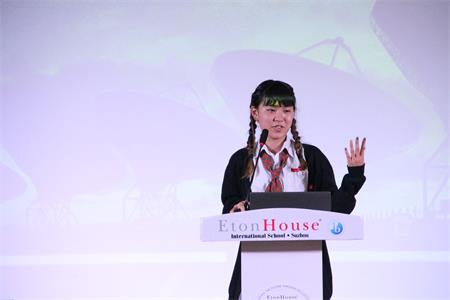Speaking without fear!
畅所欲言吧
Ask a random selection of adults to list their biggest fears, and while you might get a few answers like “flying”, or “spiders”, or “heights”, for a surprisingly large percentage of the adult population (including, oddly, many teachers) the top of the list – the scariest possible thing for them to contemplate – is speaking in public in front of an audience.
如果随机选择一个人并让他列出自己的恐惧清单,你可能会得到类似于飞翔、蜘蛛、高空等不尽相同的答案,但当众演讲一定在绝大多数人(包括老师们)的清单之中。
It has therefore been great over the last couple of years at EtonHouse to see our MYP and DP students growing more and more accustomed to being on stage and speaking in front of their peers and teachers. Not only have they grown more used to it, but they have been getting better and better at it!
因此在EtonHouse过去的几年中,我们很高兴地看到MYP和DP的学生们不断磨砺自己,越来越享受在舞台上、在伙伴和老师面前进行演讲。他们不仅克服了对演讲的恐惧,并越来越收放自如。
Opportunities for this have come in everyday classes, via student contributions to regular assemblies, and more purposefully through our Public Speaking and House Debating Competitions, designed specifically to thrust students into the spotlight, and to allow them to practice that precious, but difficult and nerve-wracking art of speaking in front of a crowd.
当然每天在课堂上同学们都会有这样的机会,但通过更有针对性的学生例会时间,我们举办公开演讲和House间的辩论比赛,将同学们推向聚光灯,在让他们公众面前锻炼这门宝贵但又令人伤透脑筋的艺术。
This is a real life-skill, valuable in so many different ways and contexts, and one that, as mentioned, many people simply do not possess. Any worthwhile education should seek to enhance this skill, to allow chances to hone and perfect the art. This is a school legacy more important than any taught fact.
这是一项广泛适用于各种场景中的实用技能,正如前文所述,可能很多人都没有这项技能。每一种有价值的教育都会提倡努力提高演讲能力,为学生制造机会并让其掌握这门艺术。 这是比任何教学事实都重要的教学传承。
As Albert Einstein is reputed to have once said, education is what remains when you have forgotten everything your teachers told you. EXPERIENCE matters!
正如阿尔伯特·爱因斯坦曾说过的那样:教育就是当一个人忘记了在学校所学的一切之后剩下的东西。体验举足轻重!
House Debating
House辩论
With this squarely in mind, the Debating Competition provides the opportunity to gain exactly this kind of experience. In addition, it develops research and critical thinking skills, hones the power of persuasion, heightens student awareness of global issues and current affairs, and, of course, teaches them a thing or two about how to effectively argue and defend their point. That’s quite a list of positives!
正因如此,辩论赛为同学们提供了获得这种体验的机会,并且它还可以发展同学们研究和批判性思维的能力,锻炼演讲力,提高同学们对全球问题、时事的认知。当然,还会教会同学们如何有效地辩论并捍卫自己的观点。益处不胜枚举。
The competition saw each of the four Houses – Han, Tang, Song and Ming – debate each other once across three preliminary rounds, with the two Houses notching up the most wins going through to the final.
比赛采用汉、唐、宋、明四个House首先经过三轮预赛,获胜较多的两队进入决赛的规则。
The format was the same for all the rounds: three speakers from each house, speaking alternately, each having two and a half minutes to state their case, with a two minute pause for team conferring in between each set of speakers. Houses were not allowed to use the same team more than once, widening the participation required from each House.
每个回合采用如下方式:每个House的成员轮流发言,他们将有两分钟的时间陈述自己的观点。每组发言者之间有两分钟的间隙进行小组讨论。每次辩论,House不可使用同一批成员,以House中每个人都要参与进来。
Adjudicated by a rotating set of four staff judges – one from each House – the students were scored both on individual and team performance, on categories such as understanding the motion, quality of oral presentation, use of facts and statistics to support the argument, respect for the opposing team and overall organization of the team argument.
评委由四位老师(每个House中一位)组成,并实现流动制,以对学生个人、团队表现进行评分,包括理解力、口头表述能力、使用客观事实和统计数据支持论点的数量、是否尊重对方团队和全局的论点等。
Round 1: Trump
The opening debates took place on the same day as the recent US Election, and to mark that occasion, the motion was:
开幕辩论那天正好是美国大选的日子,因此议题是:
“It makes no difference to the world who wins today’s US Presidential election”
今年的美国总统大选结果是否会对世界产生影响
Despite the impact that Donald Trump has had on the global scene, the students found this topic surprisingly hard to debate. Song prevailed over Ming, and Han had a convincing win over Tang in this opening exchange. Being half a world and many time zones ahead of the USA, we didn’t debate totally in step with the voting, and in any case, as we now all know, the final result took many, many days to be officially confirmed.
尽管Donald Trump在全球舞台上有着显而易见的巨大影响,但同学们惊讶地发现这个议题实际很胶着。较后宋战胜了明,汉也旗开得胜。由于同美国的时差,我们的辩论赛并没有完全和投票同步,而且现在的我们知道,较终的结果需要很多天之后才会得到正式的确认。
Round 2: Money
For the second set of debates, having argued about the merits or otherwise of a supposed billionaire American president, and with our renewed emphasis on Service & Action in mind, the motion was:
我们已经讨论了一位亿万富翁美国总统的优缺点,因此在第二轮辩论中,为了再次强调了服务和行动的重要性,我们的议题是:
“The world’s super-rich people should be required to help solve the world’s problems”
富豪是否有义务为世界问题提供援助
This topic proved a little more accessible for the students, who supported their arguments well with statistics and examples of philanthropy. The word ‘required’ in the motion was pivotal. It was sobering to consider that, in the time it took for the two debates, Amazon’s Jeff Bezos had made another $6 million! Results-wise, Song made it two wins from two, defeating Han, while Tang again went winless against Ming in a very close debate, the teams separated by just 4 points.
事实证明,同学们很容易理解这个议题,他们用统计数字和慈善事业的例子很好地佐证了他们的论点。议题之中的“required”是一个关键点。令人深思的是,就在两场辩论的这短短时间里,亚马逊的Jeff Bezos又赚了600万美元!较后,宋战胜了汉获得两场全赢的战绩,而唐则在一场精彩的辩论中以4分的微弱差距再次输给了明。
Round 3: Aliens
In a marked change of focus, we went extraterrestrial for Round 3, the motion exploring the wisdom - or otherwise – of humanity’s ongoing quest to find evidence of alien life beyond Earth:
第三轮我们将焦点转移到了宇宙,探索人类寻找地球以外的外星生命、智慧的证据或其他方面:
“The human race should not be attempting to search for alien life”
人类应不应该寻找外星生命
This seemed to pique the interest of the students more than the previous two topics, and the result was two very high scoring debates. There was an almost universal assumption by the teams that “alien life” had to mean intelligent, and probably hostile bad guys, when in reality our first proof of life beyond is likely to be microbial and very simple. With Song virtually guaranteed a place in the final, they were playing for a clean sweep of all three rounds, and duly got their third win against Tang, who ended their campaign without a win. The final debate of the day would decide who joined Song in the final, and in the end it was decided by the narrowest of margins, Ming beating Han by a single point for their second win, and a place in the Final. Had it been a draw, or a Han win, they’d have gone through instead. Someone has to lose – just ask Donald!
这轮辩论的高分似乎显示出同学们对这个议题浓厚的兴趣。这些小组几乎都默认了“外星生命”是聪慧的,可能是敌对的。但实际上,我们第一个拥有生命的证据可能只是一个非常简单的微生物。宋在这轮与唐的对决中获得胜利,以全胜的成绩确定了决赛席位,而唐则已全负的战绩结束了征程,因此当天的较后一场将决定谁会和宋一起进入决赛。较终,汉以一分之差输给了明,明的险胜让其在决赛中获得了一席之地。如果是一场平局或者汉获得了胜利,明就会被淘汰。“总有人会输的”——如果你问DonaldTrump的话。
The FINAL: Euthanasia
So, on 24th November, after three consecutive weeks of debating, the Song v Ming final arrived. The motion was befitting a Final clash – an ethically weighty and polarizing issue, which forced the students to confront some genuine moral conundrums:
经过连续三周的辩论,11月24日,我们迎来了宋明的决赛。这场议题十分切合一场较终的对决,这是一个在道德上具有重大意义及极端分化的问题,它让同学们直面一些真正的道德难题:
“Euthanasia should be legalized”
安乐死应该合法化
Both sides were excellently prepared, and saw some impassioned and strident contributions from the individual speakers. The judges awarded the highest score of the whole competition to the winners, Song, who made it a “Grand Slam” by winning every round and the Final, though Ming ran them very close indeed, coming up just 7 points short on the day.
双方都为此做了充分的准备,我们看到了一些学生慷慨激昂的发言。评委们给予了宋比赛以来的较高分,较后明以7分之差惜败,宋以全胜的战绩获得了一个“大满贯”。
The 24 debaters across the four rounds deserve huge congratulations for their hard work in preparing, as do their peers behind the scenes who helped in the research and formulation of arguments. It was especially heartening to see students from across the full age range, from Year 7 to Year 13, taking part. Valuable lessons will have been learned by all, not least about speaking without fear.
让我们对四轮辩论中的24位辩手在过程中付出的辛勤努力给予热烈掌声,同时感谢为这些精彩的辩论在幕后研究和提供帮助的同学们。令人高兴的是,从7年级到13年级的学生们都参与了进来,所有人都在这之中(尤其在无畏惧的演说方面)获得了宝贵的经验。










